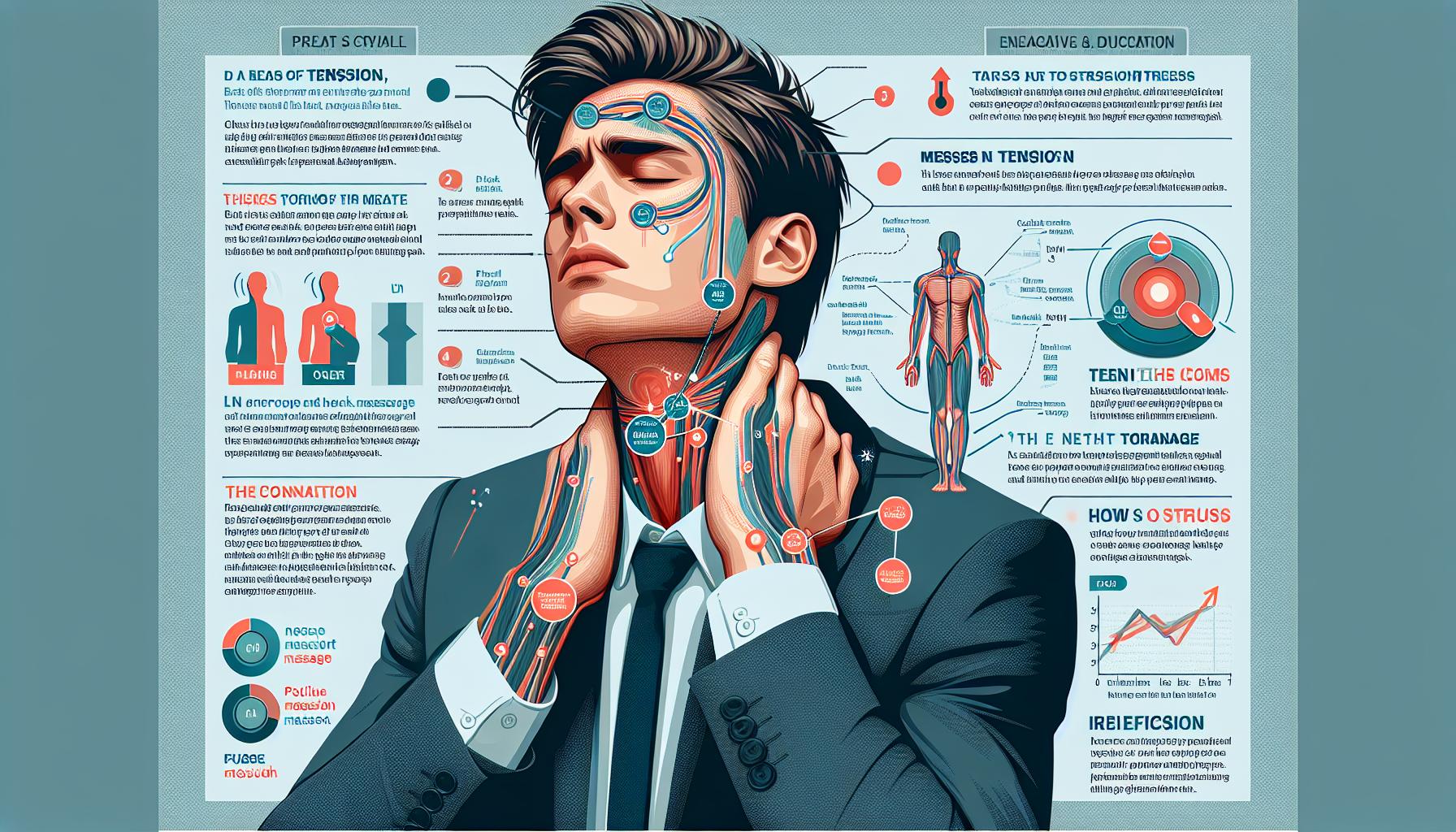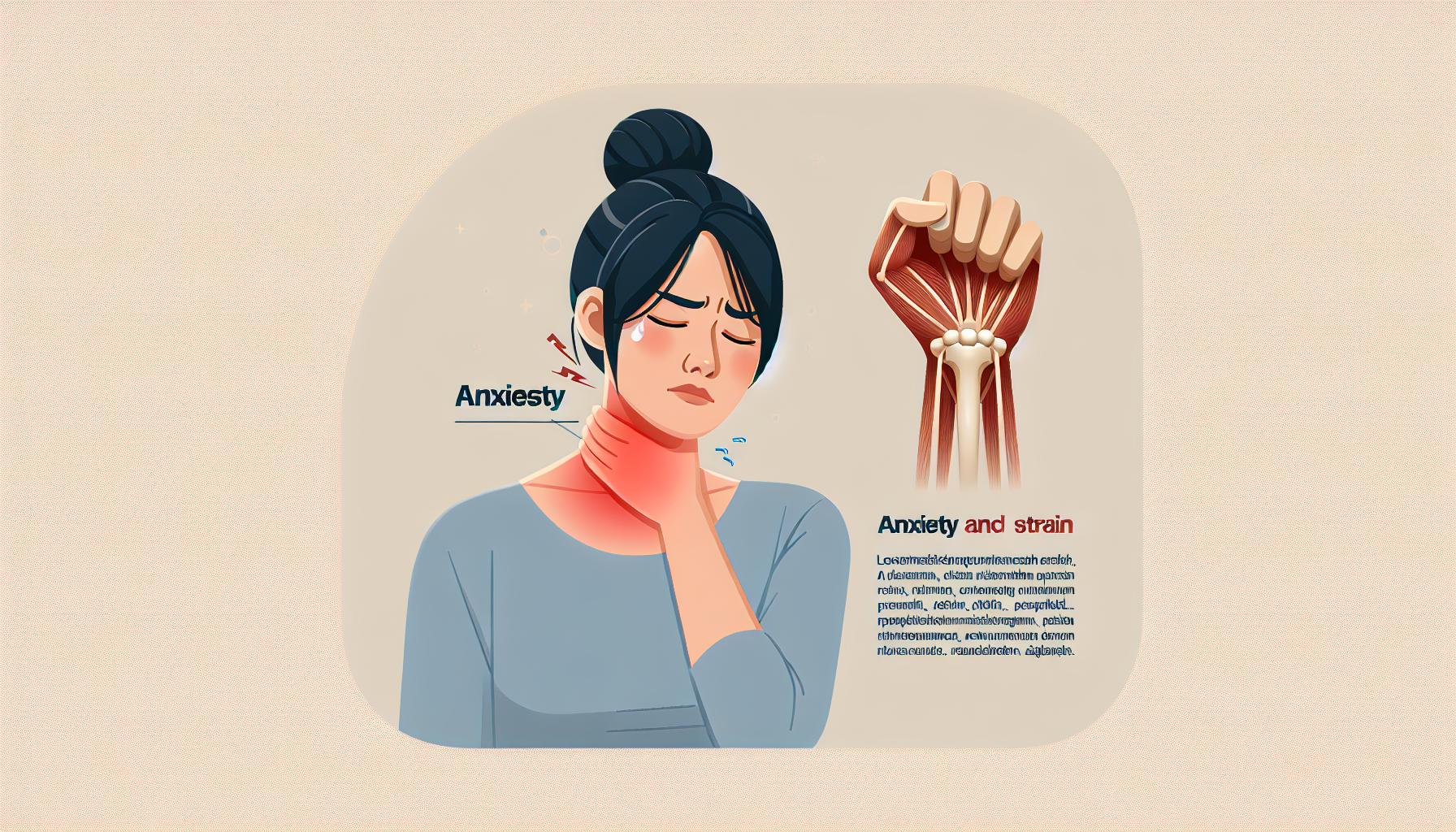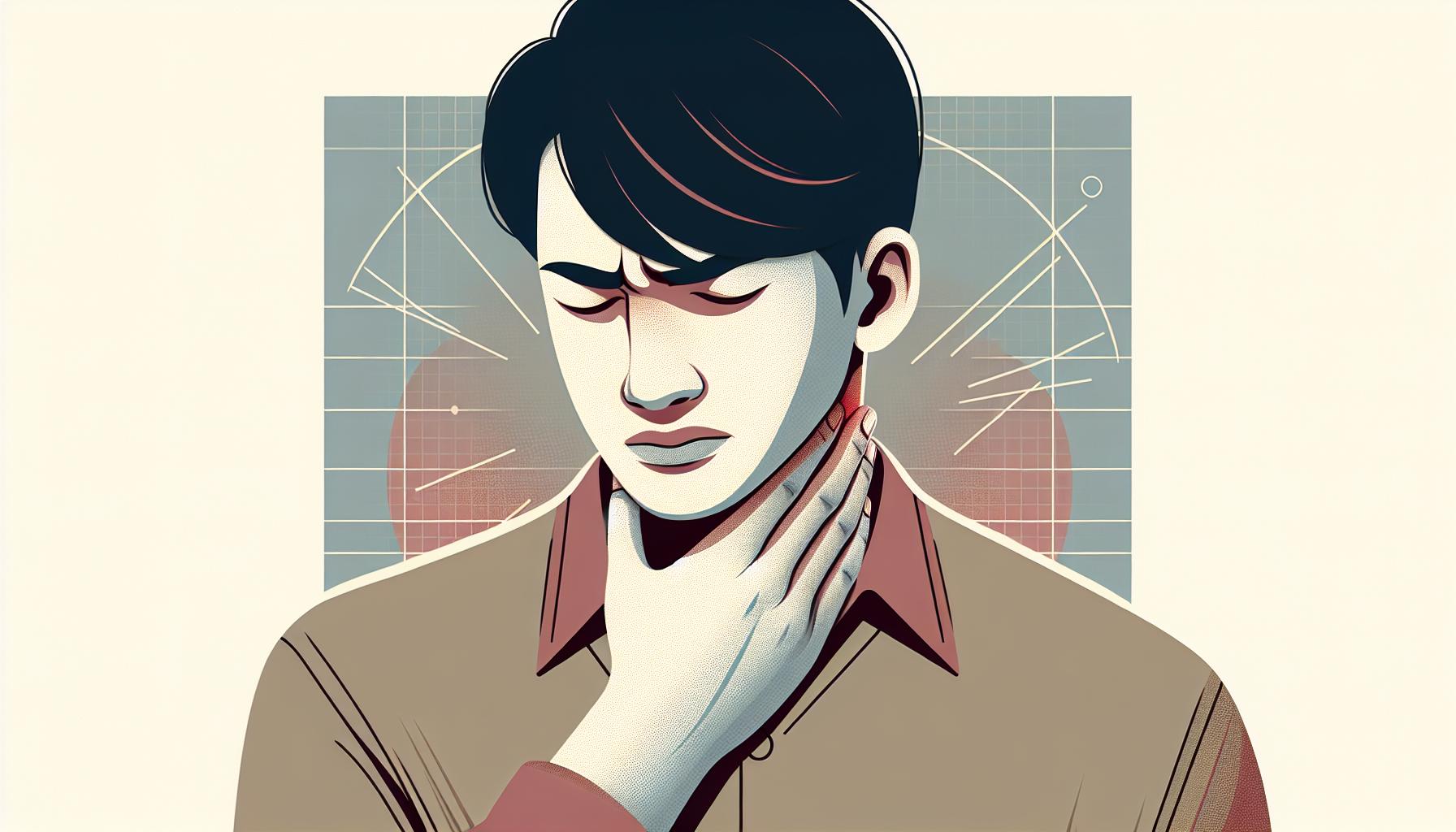Ever felt a sharp pain in your neck during a stressful day? It’s not just your imagination. Anxiety might be the real culprit behind your discomfort.
When you’re anxious, your body responds in ways you might not expect. One such response could be neck pain. But how does this happen? Let’s delve into the connection between anxiety and neck pain.
Understanding this link could be your first step towards finding relief. So, let’s explore this intriguing topic together.
Key Takeaways
- Chronic anxiety often results in physical manifestations such as neck pain due to the body’s fight-or-flight stress response mode, leading to continuous muscle tension and strain, especially in the neck and shoulder area.
- Misalignment of the body during moments of stress, or poor posture, and shallow, rapid breathing can exacerbate neck muscle strain and cause persistent discomfort.
- Symptoms of neck pain caused by anxiety include muscle tension and stiffness, reoccurring pain, a knot-feeling in the neck and tension-related headaches.
- To manage anxiety-induced neck pain, body awareness is necessary. This includes being conscious of body habits during stress, such as shoulder tensing and jaw clenching, and making sure to relax these areas.
- Regular physical activity and mind-body practices like deep breathing and meditation can significantly reduce anxiety levels and muscle tension. Proper ergonomics and maintaining good posture help in getting relief from neck pain.
- Consulting with a mental health specialist, physical therapist, or primary healthcare provider provides additional strategies for managing anxiety and consequent neck pain. Options may include cognitive-behavioral therapy (CBT), physical therapy, medication, and making some lifestyle modifications.
- Dealing with anxiety-induced neck pain takes patience and consistency as it may take time to see significant improvements, but there are a variety of effective interventions available.
The Relationship Between Anxiety and Neck Pain

When you’re constantly wrestling with anxiety, it’s not just your mind at war – your body takes a toll too. This connection might appear less clear-cut, but when diving deep, there’s a perceivable link between the two. Notably, neck pain.
Typically you’ve perceived neck pain as an outcome of poor posture or bodily injuries. While true, it’s essential to grasp that psychological discomfort can also manifest this physical pain.
Anxiety and muscle tension form a closely intertwined pair. If you’re habitually anxious, your body goes into the well-recognized fight-or-flight stress response mode. While this response is a survival instinct, continuous anxiety causes your stress responses to be in perpetual activation. This constant state of high alert results in muscles, especially those in the neck and shoulder area, to tighten persistently.
Also, when you suffer from anxiety, you tend to take shallow, rapid breaths, indirectly causing you to strain your neck muscles. Additionally, we often subconsciously hold tension in the neck and shoulder region when confronted with stressful situations, furthering this muscle strain.
Over time, a steady strain on your neck muscles can lead to muscle fatigue and pain, escalating the discomfort.
| Anxiety | Neck Pain | |
|---|---|---|
| Link | High Alert | Muscle Tension |
| Impact | Persistent Stress | Muscle strain & fatigue |
Understanding this relationship provides a clear reckoning as to why your neck might hurt when feeling as though the world is continuously spinning.
Acknowledging this connection is a vital first step in dealing with your anxiety-induced neck pain. In the upcoming sections, we’ll divulge several methods to manage this pain allowing for a more serene existence.
Remember, you aren’t alone in this struggle and there are numerous effective strategies and treatments available to help alleviate your discomfort and improve your quality of life.
The Physical Effects of Anxiety on the Neck

Whenever your body senses danger, real or imagined, your anxiety response kicks in. It’s part of your body’s mechanism to protect you. But when this response is continuously activated, it can cause physical discomfort, including persistent neck pain.
Your body’s response to anxiety is your fight or flight mechanism in action. Your muscles tighten, preparing you to face the impending threat or flee from it. If you’re experiencing chronic anxiety, this means your neck muscles might be continuously tense. Over time, this tension leads to fatigue and pain.
When you’re stressed or anxious, you might find that you hold your body differently. You may have a subconscious habit of lifting or tensing your shoulders. This strains the neck muscles, which can lead to additional discomfort.
Breathing patterns also play a part in this physical manifestation of anxiety. Shallow, rapid breathing is a common response to anxiety. Over time, these altered breathing patterns can contribute to your neck pain.
This pain is not just a minor annoyance. Chronic neck pain can interfere with your daily activities and may affect your quality of life.
To reduce this discomfort, consider methods that address both the anxiety and the consequent muscle tension. You have a few options:
- Cognitive behavioral therapy (CBT) is an effective tool in managing anxiety-related neck pain.
- Practicing mindfulness may help you become more aware of your physical responses to anxiety.
- Stretches and exercises focused on the neck may offer relief from the muscle tension.
Understanding the link between anxiety and neck pain is a key step in treating this pain. By recognizing how anxiety affects your neck physically, you can start to take steps to alleviate the discomfort.
Common Symptoms of Neck Pain Caused by Anxiety

You may initially think that the knot in your neck is just because you slept the wrong way. When you connect it with emotional stress, however, things begin to make more sense. Recognizing the intersection of physical tension and anxiety in the form of neck pain becomes the first step in addressing it. Here’s a rundown on the most-frequently-noted symptoms:
- Tension and Stiffness: The neck and shoulder muscles may feel tight or hard to the touch. This could inhibit your movement, making it hard to turn your head or balance properly.
- Pain: Reoccurring, often throbbing pain that varies in intensity could be an indication.
- Knot-Like Feeling: You could notice an uncomfortable bulge in your neck where the muscle has tightened due to prolonged tension.
- Headaches: They’re often tension-related and can be caused by strain in the muscles at the base of your skull.
Furthermore, an even more fundamental issue is at hand which you might’ve overlooked: the simple act of incorrectly holding the body during moments of stress, also known as bad posture. A slouched stance during distressing events forces the neck to work overtime, leading to strain and ultimately, pain.
Our bodies react to psychological stress by inducing a fight-or-flight response. During this state, the body tenses up as a protective response to potential pain or injury. Your muscles, particularly those in the neck and shoulders, end up in continual contraction when this anxious state extends over a prolonged period of time. Regardless of whether you consider it trivial or a byproduct of “just another busy day,” neck pain is a critical indicator of an imbalanced mental state. Thus, recognizing these symptoms helps bridge the gap between physical discomfort and emotional stress, leading to more efficient management strategies for the long-term respite of anxiety-induced neck pain.
Coping Strategies for Managing Anxiety-Induced Neck Pain
If you are dealing with neck pain due to anxiety, it’s crucial to explore coping strategies. These methods can offer you long-term relief and empower you in the face of unwanted symptoms. You don’t have to suffer in silence. Instead, harness the power of knowledge to address both your physical discomfort and the underlying anxiety causing it.
A key strategy for managing anxiety-induced neck pain involves body awareness. Are you tensing your shoulders when you’re stressed? Do you tend to clench your jaw? Noticing these patterns can be a small but impactful first step towards relief. Regularly check in with your body throughout the day, intentionally relaxing tense areas.
Exercise and Physical Activity
One effective solution is regular exercise. Physical activity can reduce anxiety levels and help to alleviate muscle tension. You don’t need to engage in high impact routines to benefit from exercise. Activities such as walking, yoga, or Pilates can be both calming and effective for neck tension relief.
Mind-Body Practices
Incorporating mind-body practices, like meditation or deep breathing, can be also highly beneficial. Techniques honed through practices such as progressive muscle relaxation and mindfulness meditation can lower your stress levels, reducing the likelihood of muscle tension.
Ergonomics and Posture
Lastly, maintaining good posture and optimizing your work environment for better ergonomics can go a long way in alleviating anxiety-induced neck pain. Adjust your workstation setup to encourage correct body alignment. If you spend a lot of time on your phone or laptop, taking frequent breaks to stretch and adjust your position can help avoid straining your neck muscles.
Everybody is different and what works for one, may not work for everyone. You may need to try several strategies and perhaps even seek professional help for optimal results. Remember, you’re not alone in facing this challenge and there are effective solutions available.
Seeking Professional Help and Treatment Options
Feeling overwhelmed with constant neck pain brought on by anxiety? Seeking professional help can prove to be a game-changer. Skilled healthcare professionals have the tools and knowledge necessary to work with you, develop an understanding of your unique needs and concerns, and offer actionable solutions. Consulting with a mental health specialist, physical therapist, or even your primary healthcare provider broadens your perspective around the issue and opens doors to new treatment avenues.
Let’s now dive into different treatment options you might consider. One approach widely recognized as beneficial is cognitive-behavioral therapy (CBT). CBT targets the ways your thoughts and behaviors contribute to anxiety, helping you reshape detrimental mindsets and reaction patterns. It’s effective in managing anxiety disorders and could potentially alleviate your neck pain.
Using physical therapy for neck pain caused by anxiety is another viable route. Physical therapists guide you through movements that strengthen muscles, improve posture, and increase flexibility. They may also recommend modifications to your workspace or daily activities to reduce strain on your neck.
Medication, while not always the first choice, can sometimes provide relief. Antidepressants, anti-anxiety drugs, and pain relievers might be worth discussing with your healthcare provider.
Lastly, let’s not forget the role of lifestyle modifications. Introducing simple changes like regular exercise, a balanced diet, sufficient sleep, and minimizing alcohol or caffeine intake can significantly impact your general well-being as well as your neck pain.
Depending on the severity of your symptoms and the level of intrusion into your daily life, you may choose to combine different treatment options. Patience and consistency are crucial here, as it may take time to see noticeable improvements.
Remember, you’re not alone in this journey. There’s a wide variety of effective alignment strategies and interventions that can help in reducing your symptoms.
Conclusion
So, you’ve learned that anxiety can indeed cause neck pain. It’s critical to remember that you’re not alone and there are effective treatments available. Consulting with healthcare professionals can provide you with a personalized plan to tackle your anxiety-induced neck pain. From cognitive-behavioral therapy to physical therapy, medication, and lifestyle changes, you’ve got a range of options to explore. It’s about finding what works best for you. Patience and consistency are your allies in this journey. Remember, it’s not just about alleviating physical discomfort but improving your overall well-being. So take a deep breath, reach out for help, and start your journey towards a pain-free and anxiety-free life.
Frequently Asked Questions
What does the article address?
The article addresses the options available for managing anxiety-induced neck pain. It focuses on the benefits of seeking professional assistance and different treatment strategies.
Who should one consult for anxiety-induced neck pain?
For anxiety-induced neck pain, it’s beneficial to consult healthcare professionals such as mental health specialists, physical therapists, and primary healthcare providers.
What treatment options are discussed in the article?
The article discusses cognitive-behavioral therapy, physical therapy, medication, and lifestyle modifications, including diet, exercise, and proper sleep, as ways to manage anxiety-induced neck pain.
What is the significance of patience and consistency in this context?
Patience and consistency are emphasized as crucial for the success of any treatment plan. Factors like the severity and duration of symptoms may vary, hence a consistent approach is necessary for effective relief.
Can a combination of the treatments be beneficial?
Absolutely! One key message is that combining different treatment options can enhance the effectiveness of treatment and lead to better management of symptoms.
The post Understanding the Link: Does Anxiety Cause Neck Pain and How to Manage It? appeared first on After Anxiety.
Understanding the Link: Does Anxiety Cause Neck Pain and How to Manage It? published first on https://after-anxiety.com/

